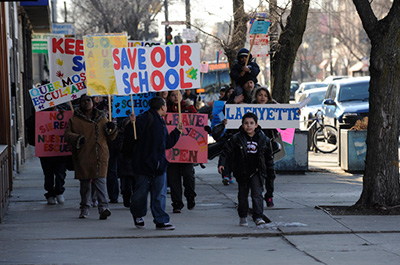New IPR Research: January 2022
Get all our news

This month’s new research from IPR faculty examines whether the assassination of President John F. Kennedy (JFK) affected birth outcomes, how Black residents’ political behavior changed after Chicago Public Schools shut down schools in their neighborhoods, and the effects of school spending on students’ education and earnings. Additionally, new research by IPR faculty covers educational mobility across generations, paternal caregiving patterns, and whether police departments should remove “bad apples,” officers with high numbers of complaints.
Social Disparities and Health
The Impact of JFK’s Assassination on Birth Outcomes
The association between stressful events during pregnancy and worrying birth outcomes, such as premature birth and low birthweight, has been widely studied. In Maternal and Child Health Journal, IPR researchers postdoctoral fellow Alexa Freedman, health psychologist Greg Miller, obstetrician and gynecologist Ann Borders, and their colleagues explore whether–and in what ways—the shock of the assassination of President John F. Kennedy (JFK) affected births to women pregnant on November 22, 1963. The study employs data from the Collaborative Perinatal Project, 1959–65, which followed pregnant participants at 12 U.S. sites over time. The researchers analyzed the births of over 30,200 pregnant participants, about 5,800 of whom were pregnant at the assassination. They determine that only those in their first trimester showed any measurable effects. They find an increased risk—a hazard ratio of 1.17, or about one-sixth more risk—of preterm birth for babies born to women in their first trimester when JKF was killed. They also detect a link to a slight reduction in birthweight for children born to those women. Additionally, the researchers compared the birth outcomes of over 1,100 pairs of siblings born to women in the study who had a child prior to the assassination and then were pregnant when the assassination occurred, seeing similar effects. The researchers did not find a connection between first trimester stress and inflammation of the placenta, which they had considered a possible mechanism in the adverse birth outcomes. The research supports the association between stress exposure early in pregnancy and preterm birth. Miller is the Louis W. Menk Professor of Psychology.
Politics, Institutions, and Public Policy
Place-Based Mobilization in Racialized Contexts
 In 2012, the Chicago Public Schools board initiated the largest wave of school closures in U.S. history, predominantly affecting the city’s Black residents even though they only made up 48% of the public school population. In American Political Science Review, IPR social policy expert Sally Nuamah and researcher Thomas Ogorzalek investigate how racially concentrated policy changes in communities translate to political action. To compare changes in political behavior before and after the school closures, they examined responses to the Cooperative Congressional Election Study, which included the respondents’ ZIP code and questions about political participation, and a dataset of precinct-level results from the Chicago Board of Elections and spatially joined Census data. They also created an original dataset of schools closed in Chicago in 2012–13 to show voters’ proximity to a community affected by school closures. They find Black residents near a school closure became more likely to attend community meetings, mobilize to support a ballot measure for an elected school board, and decrease their support for Mayor Rahm Emanuel, who had control over public school policy, in the 2015 election. Political participation in areas affected by school closures increased more than in other areas of the city—largely driven by Black residents from some of the city’s poorest neighborhoods who rarely participated before. These results support a model for place-based mobilization, or the process by which citizens respond to policy change concentrated in their community. This research highlights the role of a local community as a site of political action for marginalized groups around issues that matter to them.
In 2012, the Chicago Public Schools board initiated the largest wave of school closures in U.S. history, predominantly affecting the city’s Black residents even though they only made up 48% of the public school population. In American Political Science Review, IPR social policy expert Sally Nuamah and researcher Thomas Ogorzalek investigate how racially concentrated policy changes in communities translate to political action. To compare changes in political behavior before and after the school closures, they examined responses to the Cooperative Congressional Election Study, which included the respondents’ ZIP code and questions about political participation, and a dataset of precinct-level results from the Chicago Board of Elections and spatially joined Census data. They also created an original dataset of schools closed in Chicago in 2012–13 to show voters’ proximity to a community affected by school closures. They find Black residents near a school closure became more likely to attend community meetings, mobilize to support a ballot measure for an elected school board, and decrease their support for Mayor Rahm Emanuel, who had control over public school policy, in the 2015 election. Political participation in areas affected by school closures increased more than in other areas of the city—largely driven by Black residents from some of the city’s poorest neighborhoods who rarely participated before. These results support a model for place-based mobilization, or the process by which citizens respond to policy change concentrated in their community. This research highlights the role of a local community as a site of political action for marginalized groups around issues that matter to them.
Education Policy
The Effects of School Spending on Students’ Education and Earnings
School spending is a contentious issue in education, with some arguing it is ineffective and others advocating for more investments in education. But does school spending matter? In an IPR Working Paper, IPR economist Diane Whitmore Schanzenbach and Jesse Rothstein of the University of California-Berkeley examine whether school finance reforms and increased spending affected students’ education levels and earnings. To study the effects of increased spending, they identify 64 school finance reforms in 26 states between 1990 and 2011 and use data from the 2000–2018 American Community Survey to analyze earnings and labor outcomes of young adults who had varying exposure to school finance reforms. Schanzenbach and Rothstein find that post-1990, school finance reforms increased high school completion rates, college enrollment, and earnings. Black students and women gained the most from increased school spending. When Black students benefited from 10 years of school finance reforms, their high school graduation rates increased by 3.4 percentage points, and college attendance increased by 6.7 percentage points. For women, high school graduation rates increased by 3.2 percentage points and college attendance increased by 2.5 percentage points. While the debate over school spending continues, Schanzenbach and Rothstein show that increased spending leads to better life outcomes for students. Schanzenbach is the Margaret Walker Alexander Professor of Human Development and Social Policy.
Quantitative Methods for Policy Research
Education Mobility Across Generations
 Several researchers worldwide find a “grandparent effect” when studying socioeconomic mobility, which means older generations transmit their wealth and education to the next generation. In the Journal of Labor Economics, economist and IPR associate Joseph Ferrie and his colleagues test whether this effect applies to the United States in the 20th century by examining whether grandparents’ and parents’ education leads to more education for younger generations. Using data from the 1940 U.S. Census of Population, the Annual Social and Economic Supplement (ASEC) of the Current Population Survey (CPS), and the American Community Survey (ACS), the researchers create two two-generation samples and one three-generation sample. First, Ferrie and his colleagues investigate the relationship, or correlation, between parents’ education levels and their children’s to determine if children have an advantage and gain more education due to a more educated parent. They find that education persists across generations by about 20%, meaning younger generations benefit from the older generation. However, the researchers suspect that measurement error—in this case, whether people accurately report their education in surveys and if researchers can connect relatives across generations—incorrectly shows this large effect. Ferrie and his colleagues correct the measurement error and find the correlation between generations declines by 18.2%, suggesting older generations do not play a significant role in later generations’ educational outcomes. As inequality increases in the United States, this research has important implications for scholars and policymakers trying to identify the origins of inequality because it shows educational advantages do not transfer across generations.
Several researchers worldwide find a “grandparent effect” when studying socioeconomic mobility, which means older generations transmit their wealth and education to the next generation. In the Journal of Labor Economics, economist and IPR associate Joseph Ferrie and his colleagues test whether this effect applies to the United States in the 20th century by examining whether grandparents’ and parents’ education leads to more education for younger generations. Using data from the 1940 U.S. Census of Population, the Annual Social and Economic Supplement (ASEC) of the Current Population Survey (CPS), and the American Community Survey (ACS), the researchers create two two-generation samples and one three-generation sample. First, Ferrie and his colleagues investigate the relationship, or correlation, between parents’ education levels and their children’s to determine if children have an advantage and gain more education due to a more educated parent. They find that education persists across generations by about 20%, meaning younger generations benefit from the older generation. However, the researchers suspect that measurement error—in this case, whether people accurately report their education in surveys and if researchers can connect relatives across generations—incorrectly shows this large effect. Ferrie and his colleagues correct the measurement error and find the correlation between generations declines by 18.2%, suggesting older generations do not play a significant role in later generations’ educational outcomes. As inequality increases in the United States, this research has important implications for scholars and policymakers trying to identify the origins of inequality because it shows educational advantages do not transfer across generations.
Child, Adolescent & Family Studies
Paternal Caregiving in Cebu
Can researchers predict how much time fathers devote to childcare? In Evolution and Human Behavior, IPR anthropologists Christopher Kuzawa and Thomas McDade and their colleagues examine family-caregiving patterns in Cebu, Philippines, and test the facultative fathering hypothesis, which states that fathers’ childcare is responsive to local factors. They expect Cebuano fathers to spend more time on childcare when they work fewer hours, receive less assistance from alloparents (nonparental caregivers), live further from their wife’s family, and have more children. The researchers used questionnaire data collected in 2014 from the Cebu Longitudinal Health and Nutrition Survey (CLHNS) and focused on 430 households. Fathers self-reported how many hours they spent on various childcare tasks, while mothers answered questions about other caregivers. The researchers organized 12 childcare tasks into three categories: routine caregiving (bathing and grooming), recreational (playing and singing), and educational (helping with homework). The researchers find that fathers who worked more parented less, and fathers with higher education parented more. For example, unemployed men reported spending 8.36 hours per week on caregiving, while fathers who worked 80+ hours per week reported spending 4.16 hours. Caregiving tasks also appeared responsive to the child’s age. Fathers spent more time on routine caregiving with younger kids and more time on educational caregiving with older kids. Paternal care did not appear responsive to the family’s residence, alloparents, or the number of children. The study underscores how paternal caregiving is responsive to some locally-relevant predictors and shows what family dynamics look like in a large-scale society. Kuzawa is the John D. MacArthur Professor of Anthropology. McDade is the Carlos Montezuma Professor of Anthropology.
Urban Policy and Community Development
A Debate on Removing “Bad Apples” in Police Departments
 Should police departments remove officers with high numbers of complaints against them? In Criminology & Public Policy, IPR sociologist Andrew Papachristos and his co-author, Michael Sierra-Arévalo, debate with researchers Aaron Chalfin and Jacob Kaplan about removing officers with high numbers of complaints, or “bad apples.” Based on administrative data from the Chicago Police Department (CPD), Chalfin and Kaplan conclude that removing a “bad apple” will likely not have a large impact and would lead to only 4–6% fewer complaints involving the use of force over 10 years. Papachristos and Sierra-Arévalo disagree with their policy recommendation and explain why their conclusion is an example of “incredible certitude”—when researchers minimize the uncertainty of their results and make exact predictions of policy outcomes. They point out that the 4–6% estimate is only part of the assessment because it focuses on 18 months of complaint data. Another estimate uses five years of complaint data and shows removing a problem officer would lead to about 12–17% fewer complaints. Also, Papachristos and Sierra-Arévalo consider network spillovers, which is how much a peer’s misconduct increases an officer’s chances of misconduct later. When they calculate how much network spillovers affect the findings, the estimates increase, ranging between 22–31% fewer complaints. Additionally, Papachristos and Sierra-Arévalo argue that removing “bad apples” is a normative good that police departments should pursue, regardless of the effect size, because it reduces human suffering and saves taxpayer dollars spent on police misconduct.
Should police departments remove officers with high numbers of complaints against them? In Criminology & Public Policy, IPR sociologist Andrew Papachristos and his co-author, Michael Sierra-Arévalo, debate with researchers Aaron Chalfin and Jacob Kaplan about removing officers with high numbers of complaints, or “bad apples.” Based on administrative data from the Chicago Police Department (CPD), Chalfin and Kaplan conclude that removing a “bad apple” will likely not have a large impact and would lead to only 4–6% fewer complaints involving the use of force over 10 years. Papachristos and Sierra-Arévalo disagree with their policy recommendation and explain why their conclusion is an example of “incredible certitude”—when researchers minimize the uncertainty of their results and make exact predictions of policy outcomes. They point out that the 4–6% estimate is only part of the assessment because it focuses on 18 months of complaint data. Another estimate uses five years of complaint data and shows removing a problem officer would lead to about 12–17% fewer complaints. Also, Papachristos and Sierra-Arévalo consider network spillovers, which is how much a peer’s misconduct increases an officer’s chances of misconduct later. When they calculate how much network spillovers affect the findings, the estimates increase, ranging between 22–31% fewer complaints. Additionally, Papachristos and Sierra-Arévalo argue that removing “bad apples” is a normative good that police departments should pursue, regardless of the effect size, because it reduces human suffering and saves taxpayer dollars spent on police misconduct.
Photo credits: Pexels and Flickr
Published: January 21, 2022.


